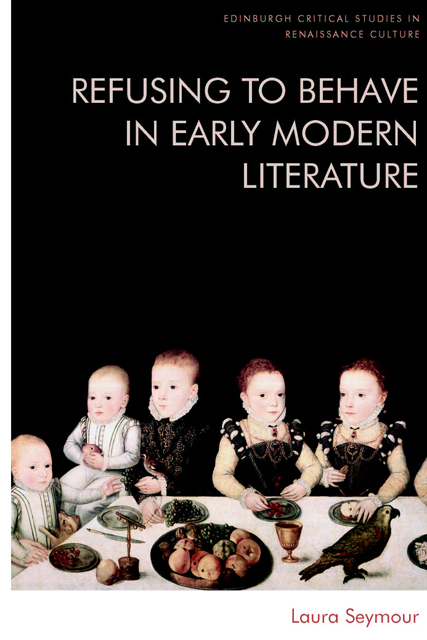Book contents
- Frontmatter
- Contents
- Acknowledgements
- Series Editor’s Preface
- Introduction: The Body at Play in Early Modern Texts
- 1 Ungracious Grace: Proprioception and Staging Taste in Thomas Dekker’s If This Be Not a Good Play, the Devil Is in It (1611)
- 2 Walking Without God – (Mis)Learning Through the Gait in Mateo Alemán’s Guzmán de Alfarache (1599 and 1604) and James Mabbe’s The Rogue (1622)
- 3 Plain Plasticity – Thomas Ellwood’s The History of the Life of Thomas Ellwood (1714)
- 4 Chaste and Silent – Again. Vitality and the Bound and Loosed Body in I.T.’s Grim the Collier of Croydon; or, The Devil and His Dame (c. 1600)
- Index
Introduction: The Body at Play in Early Modern Texts
Published online by Cambridge University Press: 25 April 2023
- Frontmatter
- Contents
- Acknowledgements
- Series Editor’s Preface
- Introduction: The Body at Play in Early Modern Texts
- 1 Ungracious Grace: Proprioception and Staging Taste in Thomas Dekker’s If This Be Not a Good Play, the Devil Is in It (1611)
- 2 Walking Without God – (Mis)Learning Through the Gait in Mateo Alemán’s Guzmán de Alfarache (1599 and 1604) and James Mabbe’s The Rogue (1622)
- 3 Plain Plasticity – Thomas Ellwood’s The History of the Life of Thomas Ellwood (1714)
- 4 Chaste and Silent – Again. Vitality and the Bound and Loosed Body in I.T.’s Grim the Collier of Croydon; or, The Devil and His Dame (c. 1600)
- Index
Summary
In his autobiographical The History of the Life of Thomas Ellwood, the Quaker Thomas Ellwood describes a decisive encounter with his aggressively anti-Quaker father, Walter Ellwood. Reflecting on his life from a delicate youth to an adult Quaker, Thomas’s History was published in 1714, about a year after he passed away, his funeral attended by ‘a large company’ of Quakers. In the decisive moment I wish to draw our attention to, Thomas runs from the family home, bent on attending a Quaker meeting, and unable to take any more of Walter’s intolerance towards his faith. Walter pursues Thomas, determined to stop him engaging in Quaker worship. Describing his and Walter’s parting, Thomas does not record them exchanging words; rather he dwells on their bodies as they move on Walter’s ground: chasing and copying each other, spurring each other on. As the son disobeys his father, he revels in representing the superior power of his youthful body; readers might laugh at Thomas’s slightly patronising recollection that Walter, venerable Justice of the Peace and patriarch, ‘held to it for a while’:
observing that my Father gained Ground upon me, I somewhat mended my Pace. This he observing, mended his Pace also; and at length Ran. Whereupon I ran also; and a fair Course we had, through a large Meadow of his, which lay behind his House and of sight of the Town. He was not, I suppose, then above Fifty Years of Age; and being light of Body, and nimble of Foot, he held to it for a while. But afterwards slacking his Pace to take Breath, and observing that I had gotten Ground of him; he turned back, and went home.
‘A fair Course we had.’ If we did not know the context, we might read this encounter as a friendly race, dance, show of kinship through bodies mirroring each other, act of intra-familial mockery, or two people expending energy for the fun and exhilaration of it. It is striking that Thomas slows his narrative to focus narrowly on the complex (inter) play of he and Walter’s bodies in the midst of sectarian and familial strife.
Thomas uses textual features – specifically polyptoton and the stop and start of meaningfully linked clauses – to represent the rhythm of his and Walter’s bodily interactions.
- Type
- Chapter
- Information
- Refusing to Behave in Early Modern Literature , pp. 1 - 7Publisher: Edinburgh University PressPrint publication year: 2022



